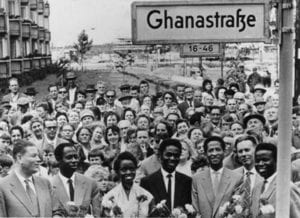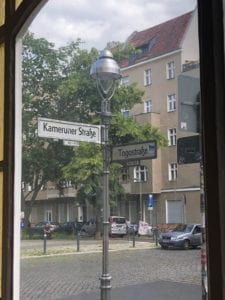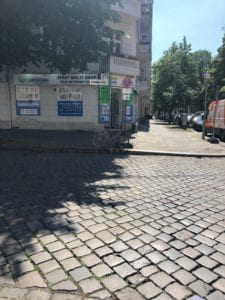Most of my extended family hails from Charleston, South Carolina. Located on the Charleston Harbor, the city has a long history of slavery and the oligarchy of White planters who control the economy and ultimately, the politics of the city. To those who have not spent a lot of time in Charleston, the city may only be notable because of the Battle of Fort Sumter. For me, that was definitely notable, but there was something that always stuck out to me since I was young. With the city’s long history comes the longstanding reality of slavery’s lasting impact. On car rides around the city, I was always intrigued by the street names because unlike my home of Chicago, there were no skyscrapers to look at while riding in a car. I realized that just like the names of people, the names of streets and other public spaces had meaning behind it. So when I saw Rutledge Avenue (named after Edward Rutledge, a strong pro-slavery voice at the Continental Congress), Calhoun Street (named after John C. Calhoun, a politician who said slavery is a “positive good”) and Colonial Lake (named after the unashamed history of—you guessed it!—colonialism), I was curious. (An honorable mention is Meeting Street. By the name, many people assume it is where White planters would meet to look at African slaves fresh off the slave ships. It’s been difficult to corroborate this fact, though). When I was young, I told my grandma that I would rename all the streets in Charleston so it would cease to honor any proponents of slavery. When I grew up, I realized how difficult that task was.
But now I am watching it happen, albeit in a different city and country. My new home of Berlin, particularly Afrikanisches Viertel (African Quarter) has taken action to fight the good fight since as early as 2004. In fact, there have been one step ahead of younger Jakiyah: they are leading the movement to rid the neighborhood of street names after colonists and settling for nothing less than renaming the streets after African freedom fighters. It is refreshing and inspiring.

The dedication of the Ghanastrasse (Ghana Street) in the Berlin district of Wedding on July 17, 1958. The second man from the right in the front row is Francis Nkrumah (Kwame Nkruma’s oldest son). © Landesarchiv Berlin
EOTO is situated in the middle of Afrikanisches Viertel, which is located in Berlin’s district of Wedding. As it has been told to me by many people, Wedding is the district of immigrants from many countries, and plenty are from the continent of Africa. Although I have only been working at EOTO for a little more than two and a half weeks, the fact that the streets I walk on for most of the week are named after (horribly violent) German colonists has not fully set in yet. Just as I disliked being reminded of the deep history of slavery in Charleston, I am constantly making myself aware of how for many in Germany, dealing with a history of colonialism is still complicated. Charleston and Berlin are different on a number of levels, but it in the name of racism, imperialism, colonialism, and many other related -isms, I find that it strangely feels like home here.

Down the street from EOTO is the corner of Togostraße and Kameruner Straße.
The origins of Afrikanisches Viertel are frightening yet important to understand when thinking about the impacts of colonialism mixed with feelings of racial superiority. Before World War I, the neighborhood was originally going to be the site of a human zoo comprised of those living in German colonies, similar to one that already existed in Hamburg. While World War I halted the plans of the zoo, it did not stop the creation of the neighborhood and the naming of streets. Colonialism was still on the minds of those in charge of naming the streets and involved with other planning of the neighborhood. Two street names that are slightly the exception are Togostraße and Kameruner Straße; they are named after Togo and Cameroon (Förster et al., 151). However, I’m not sure if they fully count because they were German colonies.
For a glimpse of who the streets of Afrikanisches Viertel honor, we can look to Lüderitzstraße. People in the neighborhood really do not like this man, as you can see from the picture I took the other day where the street sign is partially blacked out with a Sharpie. That street is one over from EOTO, and I regularly pass it whether I am running an errand, going to lunch, or going home.

Lüderitzstraße.
Lüderitzstraße is named after Adolf Luderitz who founded a Namibian colony: Deutsch-Südwestafrika. He regularly looked for areas to create new colonies and heavily dabbled in mining (Franz Adolf Lüderitz, Encyclopædia Britannica). I have been told by some people at EOTO that opponents of changing the street names think the change would require too much paperwork and confuse Google Maps, tourists, and anyone else navigating the neigborhood. For that reason, some people rather stick to what they are used to: streets named after colonists who invaded various African countries and caused inexplicable, intergenerational harm. However, the renaming of streets to reflect a want to create a kinder future is not new to Berlin; streets that once honored Hitler or the Soviets were changed and renamed after World War II.
I could never imagine what it would take to change the names of the streets in Charleston, or even if longtime residents would be interested in leading that effort amongst the many other problems in the city. But it’s happening here right in the backyard of EOTO’s office. Tomorrow, I will learn more about the renaming of the African Quarter as EOTO is hosting a decolonial “kiez” tour as part of AFROLUTION 2019. Leading the tour will be Mnyaka Sururu Mboro, a giant in the advocacy around renaming streets. He wears many hats: tour guide, founding and board member of Berlin Postkolonial e.V., and activist around the repatriation of African human remains stolen by Germany. Also on that tour will be Joshua Kwesi Aikins, a research associate and doctoral candidate of the Bielefeld Graduate School in History and Sociology at Universität Kassel. I am excited to share the space with people doing tremendous work!
For those looking to learn more about Afrikanisches Viertel in an intensive matter, I highly recommend checking out http://www.3plusx.de/leo-site/. Heads up English speakers: The website is in German, so a translation tool is needed. On the website you will find an interactive map of the neighborhood and tidbits about its history.
Works Cited
“Franz Adolf Lüderitz.” Encyclopædia Britannica, Encyclopædia Britannica, Inc., www.britannica.com/biography/Franz-Adolf-Luderitz.
Förster, Susanne, et al. “Negotiating German Colonial Heritage in Berlin’s Afrikanisches Viertel.” International Journal of Heritage Studies, vol. 22, no. 7, 2016, pp. 519-529., doi: 10.1080/13527258.2016.1182050.

It’s dumbfounding, is it not, how little we acknowledge the historical markers that surround us and yet how pervasively and demandingly they convey to us who wields power and how? For cities like Charleston and Berlin that are so proud of (in the former case) or self-aware about (in the latter case) their historical significance, it is still amazing to me that street names and monuments are still overlooked. What’s even more troubling is how little these cities explicitly address the relationship between their histories of abuse and their contemporary wealth. No doubt you’ve been following the House Judiciary Committee’s hearings this week and read Ta-Nehisi Coate’s testimony. If white lawmakers cannot see why people living in the contemporary U.S. — no matter their age — still benefit materially from slavery, it does seem hard to imagine how they can be convinced that everyday historical markers like street signs, monuments, building names, and colloquial terms for urban spaces need to be decolonized. Anyway, I hope you draw inspiration from EOTO to help bring that energy back to the U.S. You might also find this recent report interesting given your hometown. It’s not specifically about streets, but it’s related to reparation: https://socialequity.duke.edu/sites/socialequity.duke.edu/files/The%20Plunder%20of%20Black%20Wealth%20in%20Chicago.pdf
Yes, yes, and yes! It’s very interesting to me because the significance of historical markers can be downplayed sometimes when marginalized groups have bigger fish to fry. But for others, these markers are the backbones of their communities and ideology. For example, in South Carolina there are 56 active chapters of the United Daughters of the Confederacy who meet to “protect their Confederate heritage” (http://www.scudc.info/history.html). When I visit my family in Charleston, I pass their meeting place all the time because it’s centrally located downtown. Their meeting place is also the Confederate Museum which presents the Confederate history without critique, of course. My family is obviously disgusted by it, but there are often other bigger fish to fry in the realm of urban policy, i.e. police brutality. From observing EOTO, I’m learning about how organizations can fry all the fish at the same time.
Thank you for sending over that report! I was following the reparation hearings that week and this report illuminates so many things. First, it shows that the case for reparations is not one that has to start and stop at the tragedy of chattel slavery. This report gathers data from Black families in the 1950s-1960s (just one generation removed from me!) who were barred from accumulating wealth like their White counterparts. That’s non-physical violence that will have ramifications for generations to come. Secondly, the loss of wealth Black families in Chicago happened during the height of the Civil Rights Movement. This speaks to how progressive policy will not always solve the problems of inequity.